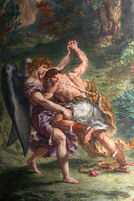 image: The Meeting of Rebekah and Isaac, Nasher Museum of Art, Duke University
image: The Meeting of Rebekah and Isaac, Nasher Museum of Art, Duke University The Bible is known to many as ‘The Good Book’, but is it actually a good book, morally speaking? In the USA this has become a political, as well as a theological, question. A Utah school district recently banned the Bible from its elementary and middle schools for what it named as ‘vulgarity and violence’.[1] This followed a parent’s complaint that the Bible has material unsuitable for children, after Utah’s Republican government had passed a law in 2022 banning ‘pornographic or indecent’ books from schools. This is not an isolated case. For recent conservative bans on books have been particularly aimed at education around LGBTIQA+ issues. Yet this can easily rebound, as it draws attention to the Bible’s moral ambiguities. Religious conservatives often assume the Scriptures to be unadulterated good news for all. Meanwhile some secularists tend to assume bad news. However, read as a whole, the Bible’s reality is that it rarely offers simple black and white morality. Rather it invites us to wrestle with its challenges, and inspirations. From this we can indeed grow in the faith, and power, of God to which the Scriptures witness. We do so however by deepening our sense of God working with and through our very human realities, not escaping from them. This is certainly true of Rebekah and Isaac, who are centre-stage in our Genesis story (in chapter 24) today…

 RSS Feed
RSS Feed